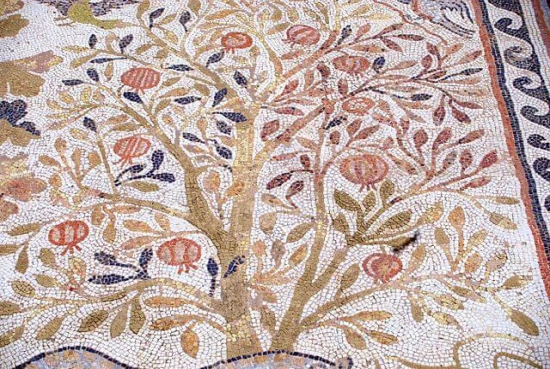1
เรา กษัตริย์เนบูคัดเนสซาร์ ขอประกาศแก่บรรดาชนชาติ ประชาชาติทั้งปวง และภาษาทั้งหลาย ซึ่งอาศัยอยู่บนพิภพทั้งสิ้นว่า สันติสุขจงมีแก่ท่านทั้งหลายอย่างทวีคูณ
2
เราเห็นสมควรที่จะแสดงหมายสำคัญและการมหัศจรรย์ ซึ่งพระเจ้าสูงสุดได้ทรงกระทำแก่เรา
3
หมายสำคัญของพระองค์ใหญ่ยิ่งสักเท่าใด การมหัศจรรย์ของพระองค์กอปรด้วยฤทธานุภาพปานใด อาณาจักรของพระองค์เป็นอาณาจักรถาวรเป็นนิตย์ และราชอาณาจักรของพระองค์นั้นดำรงอยู่ทุกชั่วอายุ
4
ตัวเรา คือ เนบูคัดเนสซาร์อยู่เป็นผาสุกในนิเวศของเรา และมีความเจริญอยู่ในวังของเรา
5
เราฝันเห็นเรื่องซึ่งกระทำให้เรากลัว ขณะเมื่อเรานอนอยู่บนที่นอนความคิดและนิมิตอันผุดขึ้นในศีรษะของเราเป็นเหตุให้เราตกใจ
6
เราจึงออกกฤษฎีกาเรียกนักปราชญ์แห่งบาบิโลนทั้งสิ้นมาหาเราเพื่อให้แก้ความฝันให้แก่เรา
7
พวกโหร พวกหมอดู และคนเคลเดีย และหมอดูฤกษ์ยามก็เข้ามาเฝ้า เราก็เล่าความฝันแก่เขา แต่เขาทั้งหลายแก้ฝันให้เราไม่ได้
8
ในที่สุดดาเนียลก็เข้ามาเฝ้าเรา เขามีชื่อว่าเบลเทชัสซาร์ ตามนามพระของเรา เขามีวิญญาณของพระเจ้าผู้บริสุทธิ์ เราก็เล่าความฝันให้เขาฟังว่า
9
"โอ เบลเทชัสซาร์ หัวหน้าของพวกโหร เพราะเราทราบว่าวิญญาณของพระเจ้าผู้บริสุทธิ์อยู่ในท่าน และไม่มีความล้ำลึกใดๆที่จะให้ท่านแก้ยาก จงบอกนิมิตทั้งหลายในความฝันที่เราได้เห็น และตีความนิมิตเหล่านั้นให้แก่เรา
10
นิมิตที่ผุดขึ้นในศีรษะของเราเมื่อนอนอยู่บนที่นอน ดูเถิด เราได้เห็นต้นไม้ท่ามกลางพิภพ มันสูงมาก
11
ต้นไม้เติบโตและแข็งแรง ยอดของมันขึ้นไปถึงฟ้าสวรรค์ และประจักษ์ไปถึงที่สุดปลายพิภพ
12
ใบก็งดงามและผลก็อุดม และจากต้นไม้นั้น มีอาหารให้แก่ชีวิตทั้งปวง สัตว์ป่าที่ในทุ่งนาอาศัยอยู่ใต้ร่มของมัน และนกในอากาศก็อาศัยอยู่ที่กิ่งก้านของมัน และเนื้อหนังทั้งหลายก็เลี้ยงตนอยู่ด้วยมัน
13
ในนิมิตที่ผุดขึ้นในศีรษะของเราเมื่อเราอยู่บนที่นอน ดูเถิด เราได้เห็นผู้พิทักษ์ องค์บริสุทธิ์ลงมาจากฟ้าสวรรค์
14
ท่านเปล่งเสียงและพูดดังนี้ว่า `จงฟันต้นไม้และตัดกิ่งทั้งหลายของมันออกเสีย สะบัดให้ใบของมันร่วงออกแล้วให้ผลของมันกระจายไป ให้สัตว์ป่าหนีไปเสียจากใต้ต้น และให้นกหนีไปเสียจากกิ่งของมัน
15
แต่จงปล่อยให้ตอรากติดอยู่ในดิน มีแผ่นเหล็กและทองสัมฤทธิ์มัดไว้ ให้อยู่ท่ามกลางหญ้าอ่อนในทุ่งนา ให้เปียกน้ำค้างจากฟ้าสวรรค์ ให้เขามีส่วนอยู่กับสัตว์ป่าในหญ้าที่พื้นดิน
16
ให้จิตใจของเขาเปลี่ยนเสียจากจิตใจมนุษย์ แล้วมอบใจสัตว์ป่าให้แก่เขา และปล่อยให้เป็นอยู่อย่างนั้นจนครบเจ็ดวาระ
17
คำพิพากษานั้นเป็นคำสั่งของผู้พิทักษ์ คำตัดสินนั้นเป็นวาทะขององค์บริสุทธิ์ เพื่อผู้มีชีวิตอยู่จะได้ทราบว่าท่านผู้สูงสุดทรงปกครองอยู่เหนือราชอาณาจักรของมนุษย์ และประทานราชอาณาจักรนั้นแก่ผู้ที่พระองค์จะประทาน และตั้งผู้ที่ด้อยที่สุดให้อยู่เหนือ'
18
ความฝันนี้ตัวเราคือกษัตริย์เนบูคัดเนสซาร์ได้เห็นและ โอ เบลเทชัสซาร์ ท่านจงกล่าวคำแก้ฝันเถิด เพราะพวกนักปราชญ์ทั้งสิ้นแห่งราชอาณาจักรของเราไม่สามารถที่จะให้คำแก้ความฝันแก่เรา แต่ท่านสามารถ เพราะวิญญาณของพระเจ้าผู้บริสุทธิ์อยู่ในตัวท่าน"
19
แล้วดาเนียล ผู้มีชื่อว่าเบลเทชัสซาร์ ก็งงงันอยู่ชั่วโมงหนึ่ง ความคิดของท่านก็กระทำให้ท่านตกใจ กษัตริย์ตรัสว่า "เบลเทชัสซาร์เอ๋ย อย่าให้ความฝันหรือคำแก้ความฝันกระทำให้ท่านตกใจเลย" เบลเทชัสซาร์ทูลตอบว่า "เจ้านายของข้าพระองค์ ขอให้ความฝันนั้นเป็นเรื่องของผู้ที่เกลียดชังพระองค์เถิด และขอให้คำแก้ความฝันนั้นตกแก่ปฏิปักษ์ของพระองค์
20
ต้นไม้ที่พระองค์ทอดพระเนตร ซึ่งเติบโตขึ้นและแข็งแรง จนยอดขึ้นไปถึงฟ้าสวรรค์ ประจักษ์ไปทั่วพิภพทั้งสิ้น
21
ใบของมันก็งดงามและผลก็อุดม และจากต้นนั้นมีอาหารให้แก่ชีวิตทั้งปวง สัตว์ป่าในทุ่งนามาพึ่งร่มอยู่ใต้ต้น และนกในอากาศก็มาอาศัยอยู่ที่กิ่ง
22
ข้าแต่กษัตริย์ นี่คือพระองค์เอง ผู้ทรงเจริญและเข้มแข็ง ความยิ่งใหญ่ของพระองค์ได้เจริญ และขึ้นไปถึงฟ้าสวรรค์ และราชอาณาจักรของพระองค์ก็ไปถึงสุดปลายพิภพ
23
และที่กษัตริย์ทอดพระเนตรผู้พิทักษ์คือองค์บริสุทธิ์ลงมาจากฟ้าสวรรค์ และพูดว่า `จงฟันต้นไม้และทำลายเสีย แต่จงปล่อยให้ตอรากติดอยู่ในดิน มีแผ่นเหล็กและทองสัมฤทธิ์มัดไว้ ให้อยู่ท่ามกลางหญ้าอ่อน ในทุ่งนาให้เปียกน้ำค้างจากฟ้าสวรรค์ ให้เขามีส่วนอยู่กับสัตว์ป่า และปล่อยให้อยู่อย่างนั้นจนครบเจ็ดวาระ'
24
ข้าแต่กษัตริย์ ต่อไปนี้เป็นคำแก้พระสุบิน เป็นพระราชกฤษฎีกามาจากผู้สูงสุด ซึ่งมาถึงกษัตริย์เจ้านายของข้าพระองค์
25
ว่าพระองค์จะทรงถูกขับไล่ไปเสียจากท่ามกลางมนุษย์ และพระองค์จะอยู่กับสัตว์ในทุ่งนา พระองค์จะต้องเสวยหญ้าอย่างกับวัว และจะให้พระองค์เปียกน้ำค้างจากฟ้าสวรรค์ จะเป็นอยู่อย่างนั้นจนครบเจ็ดวาระ จนกว่าพระองค์จะทราบว่า ผู้สูงสุดนั้นทรงปกครองราชอาณาจักรของมนุษย์ และพระองค์จะประทานราชอาณาจักรนั้นแก่ผู้ที่พระองค์ทรงปรารถนา
26
และที่ทรงมีพระบัญชาให้เหลือตอรากต้นไม้นั้นไว้ก็หมายความว่า ราชอาณาจักรจะยังเป็นของพระองค์ ตั้งแต่พระองค์ทรงทราบว่าสวรรค์ปกครอง
27
ข้าแต่กษัตริย์ เพราะฉะนั้นขอทรงรับคำกราบทูลของข้าพระองค์ ขอพระองค์ทรงเลิกทำบาปเสียด้วยการกระทำความชอบธรรม และเลิกทำความชั่วช้าด้วยสำแดงความกรุณาต่อคนจน เผื่อว่าความผาสุกของพระองค์อาจจะยืดยาวไปอีกได้"
28
สิ่งเหล่านี้ทั้งสิ้นได้บังเกิดขึ้นแก่กษัตริย์เนบูคัดเนสซาร์
29
พอสิ้นสิบสองเดือน พระองค์เสด็จดำเนินอยู่ในพระราชวังแห่งราชอาณาจักรบาบิโลน
30
และกษัตริย์ตรัสว่า "นี่เป็นมหาบาบิโลนมิใช่หรือ ซึ่งเราได้สร้างไว้เพื่อวงศ์วานแห่งอาณาจักรนี้ด้วยอำนาจใหญ่ยิ่งของเรา และเพื่อเป็นศักดิ์ศรีอันสูงส่งของเรา"
31
เมื่อกษัตริย์ตรัสยังไม่ทันขาดพระวาทะ ก็มีเสียงตกลงมาจากฟ้าสวรรค์ว่า "โอ กษัตริย์เนบูคัดเนสซาร์ เราลั่นวาจาไว้กับเจ้าแล้วว่า ราชอาณาจักรได้พรากไปเสียจากเจ้าแล้ว
32
และเจ้าจะถูกขับไล่ไปจากท่ามกลางมนุษย์ และเจ้าจะอยู่กับสัตว์ในทุ่งนา และเจ้าจะต้องกินหญ้าอย่างกับวัว จะเป็นอยู่อย่างนั้นจนครบเจ็ดวาระ จนกว่าเจ้าจะเรียนรู้ได้ว่า ผู้สูงสุดปกครองอยู่เหนือราชอาณาจักรของมนุษย์ และประทานราชอาณาจักรนั้นแก่ผู้ที่พระองค์ทรงปรารถนา"
33
ในทันใดนั้นเองพระวาทะก็สำเร็จในเรื่องเนบูคัดเนสซาร์ พระองค์ถูกขับไล่ไปจากท่ามกลางมนุษย์ และเสวยหญ้าอย่างกับวัว และพระกายก็เปียกน้ำค้างจากฟ้าสวรรค์ จนพระเกศางอกยาวอย่างกับขนนกอินทรี และพระนขาก็เหมือนเล็บนก
34
เมื่อสิ้นสุดวาระนั้นแล้ว ตัวเราเนบูคัดเนสซาร์ก็แหงนหน้าดูฟ้าสวรรค์และจิตปกติของเราคืนมา และเราก็สาธุการแด่ผู้สูงสุดนั้น และสรรเสริญถวายเกียรติยศแด่พระองค์ผู้ดำรงอยู่เป็นนิตย์ เพราะราชอาณาจักรของพระองค์เป็นราชอาณาจักรนิรันดร์ และอาณาจักรของพระองค์ดำรงอยู่ทุกชั่วอายุ
35
สำหรับพระองค์ชาวพิภพทั้งสิ้นนับว่าไม่มีค่า ท่ามกลางกองทัพแห่งสวรรค์นั้นพระองค์ทรงกระทำตามชอบพระทัยพระองค์ และท่ามกลางชาวพิภพด้วย และไม่มีผู้ใดยับยั้งพระหัตถ์ของพระองค์ได้ หรือตรัสถามพระองค์ได้ว่า "พระองค์ทรงกระทำสิ่งใด"
36
ในเวลานั้นเอง จิตปกติของเราก็กลับคืนมา ความสูงส่งและราชสง่าราศรีกลับมาสู่เราอีก เพื่อสง่าราศีแห่งราชอาณาจักรของเรา องคมนตรีและข้าราชบริพารของเรากลับมาหาเรา และเราก็รับการสถาปนาไว้ในราชอาณาจักรของเรา ความใหญ่ยิ่งกลับเพิ่มพูนแก่เราขึ้นอีก
37
บัดนี้ตัวเราคือเนบูคัดเนสซาร์ ขอสรรเสริญ ยกย่องและถวายพระเกียรติแด่พระมหากษัตริย์แห่งสวรรค์ เพราะว่าพระราชกิจของพระองค์ก็ถูกต้อง และพระมรรคาของพระองค์ก็เที่ยงธรรม บรรดาผู้ดำเนินอยู่ในความเย่อหยิ่ง พระองค์ก็ทรงสามารถให้ต่ำลง







